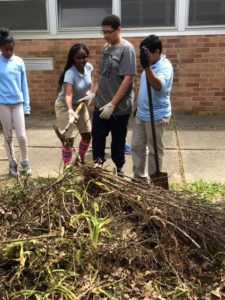
Pennsauken Township’s Phifer Middle School is committing to sustainability. Phifer is the latest to register as an Eco-School with Eco-Schools USA in New Jersey, a partnership between National Wildlife Federation and New Jersey Audubon. Eco-Schools USA, is based on the work of student-driven teams dedicated to issues like recycling and energy conservation and claims more than 4,300 schools in the nation. There are more than 200 Eco-Schools throughout New Jersey and 14 registered in Camden County.
Seventh grade students are taking the lead on sustainability initiatives at the Phifer Middle School. First on the agenda is building a school vegetable garden using the innovative technique called hugelkultur, which essentially means hill mound. Hugelkultur is a method of raised bed gardening that utilizes layers of old sticks, logs and leaves and creates a nutrient rich soil with superior irrigation that requires less intensive watering than a traditional raised bed. The students are also learning how to “feed the soil” by creating their own compost, using worms and old food scraps. Other students are collecting trash to create upcycling projects that will decorate the garden space.
These efforts are the result of Phifer Middle School’s Green Team which is comprised of seventh graders and led by teachers Jacklyn Walther, Cyndi Kehl, and Lisa Hybiski. Ms. Walther also owns The Square Meal, a restaurant celebrating sustainable agriculture in Oaklyn, NJ.
“This kind of learning really gets the students excited, says seventh grade teacher and green team leader, Jaclyn Walther. “Kids thrive on being outside with a rake and a shovel. It really engages them.”
The group plans to expand their efforts in the near future by collecting more food waste from the cafeteria to grow their composting operation and reduce the amount of waste being produced by the school.
Projects like these help schools progress through the Eco-Schools USA framework and earn awards for their successes. Schools select from ten environmental focus areas or pathways to work on such as energy efficiency, biodiversity, and sustainable foods. In addition to direct environmental benefits, the program helps to dramatically improve student skills in Science, Technology, Engineering and Math (STEM). It is also a proven framework for promoting youth leadership and community service.
Allison Mulch, Eco-Schools coordinator, New Jersey Audubon says “Phifer Middle School is bringing science to life for these students. While the students are making their school a greener space they are also gaining STEM skills and learning valuable lessons in environmental responsibility.”
Participating schools have access to free resources that tie in with existing curriculum through the Eco-Schools USA website along with opportunities to connect with and learn from other participants. Thanks to support from the PSEG Foundation, Eco-Schools in New Jersey have the added benefit of working with a coordinator through NJ Audubon who provides free training for teachers, administrators and school board members throughout the state. The PSEG Foundation provides support through grant money and volunteerism.
